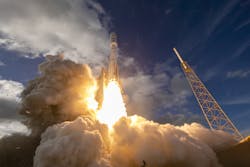ULA launches pair of SES commercial C-band 5G communications satellites
CAPE CANAVERAL SPACE FORCE STATION, Fla., - A United Launch Alliance (ULA) Atlas V rocket carrying the SES-20 and SES-21 satellites in a dual-satellite configuration lifted off on Oct. 4 at 5:36 p.m. EDT from Space Launch Complex-41 at Cape Canaveral Space Force Station. ULA is a joint venture between Boeing and Lockheed Martin and is based in Denver.
The Boeing-built C-band satellites, launched on an Atlas V 531 configuration rocket, will enable SES to continue providing data and TV transmission services to nearly 120 million American homes. The launch of SES-20 and SES-21 is part of a broader Federal Communications Commission (FCC) program to clear a portion of C-band spectrum to enable wireless operators to deploy 5G services across the contiguous US. This was the 96th launch of the Atlas V rocket, the 80th Atlas V launch from SLC-41 and the 107th launch from SLC-41.
Following on-orbit checkouts, SES-20 and SES-21 are expected to begin operations in November. The satellites are part of SES's accelerated C-band clearing plan to meet the U.S. Federal Communications Commission's objectives to roll out 5G services across the United States, an initiative that impacts all mobile users. The satellites are currently orbit-raising to their test locations using electric propulsion en route to their final orbital operating slots at 103 degrees West and 131 degrees West, respectively.
"We're excited to support our commercial partner SES in their C-band transition efforts to meet the FCC's objective to deploy 5G service across the U.S. Their mission aligns with our mission to connect the world and these capabilities will enable uninterrupted commercial services to many Americans," said Gary Wentz, ULA vice president of Government and Commercial Programs. "The Atlas V delivered the satellites accurately to a near-geosynchronous orbit 22,300 miles (35,888 km) above the equator. Thank you to the ULA team and our partners for ensuring the successful delivery of this multi-payload mission to orbit."
ULA's next launch is the Joint Polar Satellite System (JPSS)-2 civilian polar-orbiting weather mission for the National Oceanic Atmospheric Administration (NOAA) and NASA and NASA's Low-Earth Orbit Flight Test of an Inflatable Decelerator (LOFTID). The launch is planned for Nov. 1 from Space Launch Complex-3 at Vandenberg Space Force Base, California.
